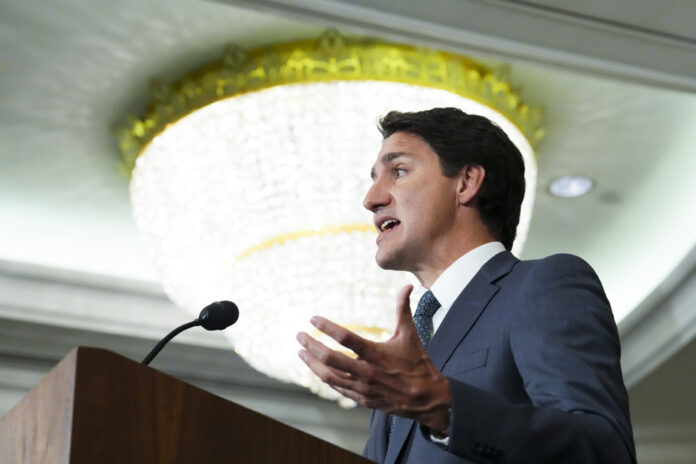(Singapore) Prime Minister Justin Trudeau says rocky relations between Canada and China have stabilized, announcing to Singapore business leaders that Ottawa is committed to a timeline for trade deals with the region.
“I don’t think that the idea of crossing our arms and turning our back on any part of the world is something good for the Canadian economy,” he said Thursday during an event organized by Bloomberg.
Trudeau continues his week-long visit to Indonesia, Singapore and India, with a focus on boosting trade in a region Ottawa sees as key to thwarting China’s coercive economic measures.
He noted that his visit comes as Western countries coordinate their trade approach with Beijing. Previously, the prime minister said, when countries competed against each other, China could take advantage of this situation, for example by limiting trade during diplomatic disputes or unwanted discussions on human rights.
“(China) just played us off each other a little bit, strategically, which was very effective,” he argued.
To that end, Mr. Trudeau noted that Canada and Indonesia are committed to signing a bilateral trade agreement by the end of 2024, and he announced this week his intention to finalize a separate agreement by 2025 with the Association of Southeast Asian Nations (ASEAN).
Singapore interested in Canada
Justin Trudeau’s visit to the city-state comes as Singapore businesses look to Canada for ways to reduce greenhouse gas emissions while strengthening global supply chains.
“Canada knows well the importance of diversifying our relationships and our supply chain,” he said at a press conference Friday morning, as he began his final day in Singapore.
“That’s exactly what we’re doing here in Southeast Asia. »
Mr. Trudeau held four meetings Thursday with business leaders from the region and is expected to meet Singapore Prime Minister Lee Hsien Loong on Friday.
Vijay Iyengar, president and CEO of a company that invests in the sustainable sourcing of agri-food products, met with Mr. Trudeau on Thursday.
During the meeting, he said Agrocorp International, which already invests heavily in Saskatchewan and Alberta, is looking for ways to reduce global greenhouse gas emissions and “do what’s right, knowing what’s right.” is good for our future.”
“Canada is a hot spot for us,” Iyengar said of future investments.
Mr. Trudeau presented Canada as a place of stability, growth and diversity that will ensure reliability and job growth in Singapore.
Wayne Farmer, president of the Canada-ASEAN Business Council, said promoting local businesses and products requires face-to-face meetings with Indo-Pacific leaders.
“A big part of promoting Canada’s interests here is the contact that is necessary between senior government leaders and senior private sector leaders,” he explained Thursday.
The visit to Singapore follows a stop in Jakarta, Indonesia, where Canada launched a strategic partnership with the ten-nation ASEAN economic bloc.
The partnership is seen as a symbolic gesture that reflects Canada’s expanded presence in the Indo-Pacific region.
This weekend, Mr. Trudeau will travel to India for the G20 leaders’ summit in New Delhi. Canada is also negotiating a free trade agreement with India, although negotiations have been suspended in recent months to resolve unspecified issues.
Justin Trudeau said that during his visit, regional leaders told him they did not want to find themselves caught between the United States and China vying for influence.
“One of the things I’ve heard a lot from people here in the ASEAN economies in Southeast Asia is a desire to make sure that we don’t widen the differences between the different economic giants,” he said at the Bloomberg event.
Pressed with questions, Mr. Trudeau declined to say whether he thought U.S. restrictions on China’s use of certain semiconductor technologies went beyond national security concerns and hampered Beijing’s rise.
“You can make diversification decisions without making it a geopolitical conflict,” he said.
Trudeau described Canada-China relations as “probably stable” and not deteriorating, but added that rapprochement is impossible “at this point in time,” in part because of concerns about interference foreign.















